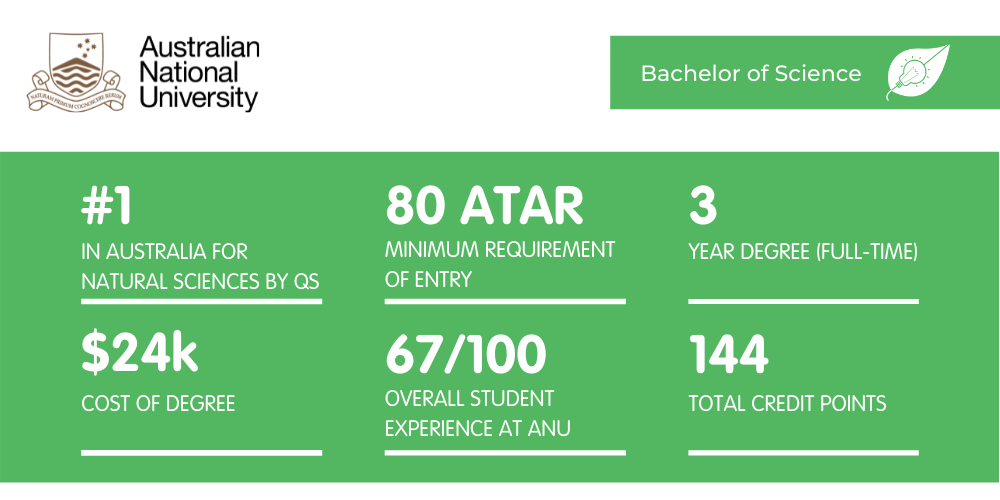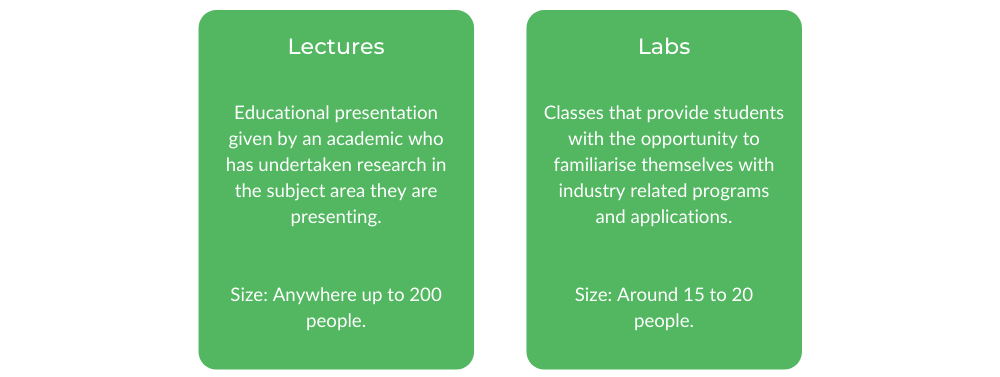Are you a science lover, but aren’t too sure about what you really want to do after high school? Why not consider a Bachelor of Science at ANU, where you can choose to major in a specific area of interest or even do it in a double degree?
If it’s a degree you’re thinking about, then we’ve got the stuff you need to help you make an informed decision, such as the different units you’re required to study, how classes are structured, societies you can join, and more.
Let’s dive into everything there is for you to know about a Bachelor of Science at ANU!
What is a Bachelor of Science at ANU?
Core Units and Majors
How to Get into a Bachelor of Science at ANU
What’s the Teaching Format?
What’s the Faculty and Culture Like?
What is a Bachelor of Science at ANU?
A Bachelor of Science allows you to explore the whole field of sciences, including physics, biology, chemistry, psychology and many more! You’re given the opportunity to learn about science in the modern world and different technological applications that are relevant to your industry.
At ANU, you can also choose to complete a Bachelor of Science (Advanced) (Honours), a Bachelor of Science (Psychology) (Honours) or complete Science in a flexible double degree with a Bachelor of Arts. These options would mean 4 years of full-time study rather than 3, however they give you the opportunity to pursue honours after your undergraduate degree.
If you do wish to pursue Honours, you need to achieve a weighted average mark (WAM) of 70 across 36 credit points or units. This does not include first year, 1000 level units, but rather subjects that align with what you wish to specialise in for your Honours year.
“As there’s such a broad range of students, ANU does a really great job of catering to everyone — they’re very accommodating.” — Eleanor Clifford, Bachelor of Arts (Gender Studies and Criminology)/Bachelor of Science IV (Psychology) at ANU
Career Paths
There is a massive pool of career paths that you can choose from after completing a Bachelor of Science. Of course, these careers will vary depending on what you choose to major in:
-
- Biologist
- Researcher
- Academic
- Psychologist
- Physicist
- Meteorologist
- Teacher
- Fieldworker
Core Units and Majors
What are the Core Units?
Essentially, your core units will depend on the major you choose. So if you choose a Psychology major, the compulsory subjects you have to complete will be from the Psychology department.
As Eleanor completed a Psychology major, she has to complete subjects from Statistics to Personality Psychology. In terms of Statistics, there are two core units you must complete — Quantitative Methods in Psychology and Advanced Research Methods.
“They are quite difficult, but I think it’s important to note that you don’t want those two subjects to scare you away from the degree. You do have to work hard in them, but there are resources to help you through it!” — Eleanor
On the other hand, Personality Psychology was “more of a fun compulsory course if you will — it’s fascinating!”
As you can see the core subjects will give you the variety that your major entails, and ensures that you’re covering all areas of study! This means that you will have to take subjects that you may not find as interesting as others, particularly in first year and second year.
Alongside this, you will have to complete a number of science electives and a few non-science electives if you choose to brand out into other areas of study.
What majors can you study?
For a Bachelor of Science you must have at least one major from a huge list, including:
-
- Human biology
- Water science
- Earth science
- Physics
- Environmental science
- Biochemistry
- Psychology
- Sciences communication
- Earth science
… and so many more, which you can find here (under the ‘Study’ tab)!
What’s a Psychology major like?
If you choose to take a Psychology major, you’ll develop a scientific perspective on human behaviours and cognitive processes. You will also look at the biological factors in behaviour, how we develop as humans and how perceptions change.
Minors and Specialisations
It is also optional to choose a minor, which can includes areas similar to majors and more specific studies like:
-
- Human eulogy
- Philosophy and science
- Applied statistics
- Earth and marine science
- Biological neuropsychology
- Forest science and policy
Alternatively, you can choose to complete a specialisation instead of a minor, from some of the areas listed below, and many more:
-
- Advanced Chemistry
- Geophysics and geology
- Optics
- Microbiology and immunology
- Biochemistry
- Astronomy and astrophysics
As you can see, a Bachelor of Science at ANU really does cover almost everything science related! You’ve got an incredibly comprehensive choice of majors in addition to a minor or a specialisation, so you can explore what it is that really interests you.
How to Get into a Bachelor of Science at ANU
To be accepted into a Bachelor of Science at ANU, you’ll need to achieve an ATAR of 80.
Early Entry and Pathways
It is also a common pathway into a Bachelor of Psychology at ANU which has a higher ATAR, so many students will major in Psychology to then transfer. A Bachelor of Science can also be used as a pathway to get into Medicine or Engineering, by transferring degrees after a year or more.
You can also apply for early entry to ANU with your Year 11 results to receive guaranteed entry into the degree before sitting the HSC. Note that you would still be required to complete the HSC and receive an ATAR, however it provides the safety net that if you do not receive the necessary ATAR of 80.00, you will still get into the course with your Year 11 results.
Alternatively, you could apply for the ANU College which is a pathway program for ANU. For instance, you could complete a Diploma of Science with the College, which is a one year undergraduate program that requires an ATAR of 70. There are also Foundation Studies if you did not complete the Year 12 curriculum.
Prerequisites
There are no prerequisites to study a Bachelor of Science at ANU, however if you have an idea of what major and minor/specialisation you want to do, it may be beneficial to take the corresponding Science subject in high school. Nonetheless, it is not required.
Scholarships
There are a whole range of scholarships for science students at ANU, such as the Angus Nicholson Honours Scholarship in Science, or the Anjeli Nathan Memorial Scholarship. The majority of these scholarships are based on academic performance and marks.
However, if you may be eligible for a financial hardship or equity scholarship of sorts, you can have a look in the ANU scholarship search.
What’s the Teaching Format?
ANU runs in a semester format, and depending on your Science major, you may have labs or workshops in addition to tutorials and lectures. Generally speaking, attendance for classes are particularly strict in Science, and you can expect more classes compared to other degrees.
Class Structure
In a Psychology major, you have labs and lectures.
Lab classes are essentially tutorials, and you often work with computer programs or occasionally you will be in a traditional laboratory. There are 15 to 20 students in a lab, and you work on experiments whether that be statistical or research based, on the computer. Labs run once a fortnight and usually go for 3 hours.
You also have lectures every week, which are usually 2 hours with up to 200 students in the cohort. Lectures are designed to cover content which will often be needed for exams and to apply in labs or tutorials.
How much time do you spend in classes?
Depending on your major, you can expect a minimum of 12 contact hours a week, but up to 20 contact hours in total. You will also find that you have more contact hours in the first and second year.
What are the assessments like?
With a Bachelor of Science at ANU, you have all sorts of assessments and it really depends on the subjects. This includes group projects, assignments, mid-semester and final exams.
“I would say the more science-based Psychology subjects are more exam heavy, whereas Social Psychology and Behaviour are more group presentations and assignments.” — Eleanor
Skills You Refine and Learn
For a Science degree at ANU, in general you gain critical thinking and analytical skills. This includes being able to look at different angles when approaching a theory or concept and considering a number of perspectives.
“There is a lot of emphasis when doing a research report, that you can think outside the box, because that’s where the marks are.” — Eleanor
In terms of majoring in Psychology especially, you become familiar with statistics, you learn to read and understand numbers as a reflection of behaviour.
Interested in the pros and cons of this degree? Check out our article here!
What’s the Faculty and Culture Like?
“I think it is really good — I couldn’t fault it! So many people that go to ANU live on campus, so people do get quite involved and everyone is lovely. It’s not competitive at all, everyone helps each other out and classes tend to form study groups.” — Eleanor
The overall atmosphere in Science at ANU is considerably helpful and supportive. There are a range of career nights and networking opportunities that you can get involved with. You can also join a society that’s specific to your major, for instance, Psychology Society!
There is also the Science Society at ANU, which is a great place for all students in areas of STEM to get together for talks, networking, career events, workshops and mentoring opportunities!
The culture also extends to the teachers and lecturers, who are described as “lovely and understanding, they’re very compensating in providing help and extensions.”
Support Programs
For certain subjects, if many students are struggling, tutors will often open a weekly study group to spend time going over class content. It is also very easy to reach out to your tutor by email to receive further personal help, for instance if you’re working on an assignment.
There is also a student help desk at ANU that will provide you with help on assignments or studying. If you’re in first year in particular, ANU runs a number of different workshops and sessions to provide you with support in basic academic skills like essay writing and referencing.
There is also the Education Access Plan (EAP) which is for students with disabilities. This program supports students with special provisions or assessment extensions where necessary.
“What ANU does really well, is take into consideration the fact that everyone comes in at different levels.” — Eleanor
Nandini Dhir is a Content Writer at Art of Smart and is currently studying a Bachelor of Arts (majoring in Marketing) and a Bachelor of Advanced Studies (Media and Communications), as a Dalyell Scholar, at Sydney University. She enjoys covering local issues in her area and writing about current events in the media. Nandini has had one of her pieces published in an article with the Sydney Morning Herald. In her free time, Nandini loves doing calligraphy, ballet, and sewing, or is otherwise found coddling her cats.






